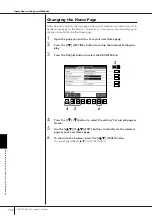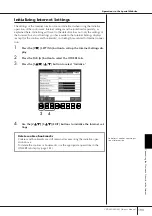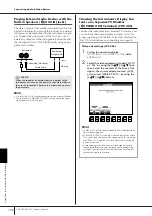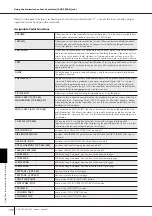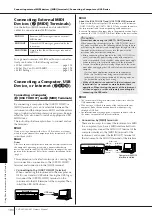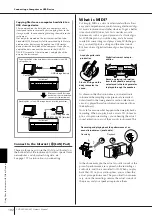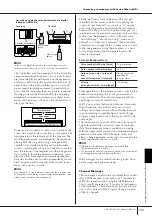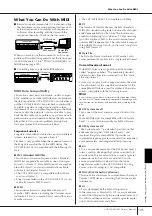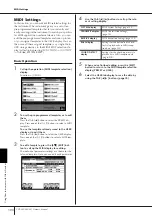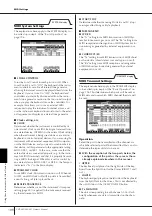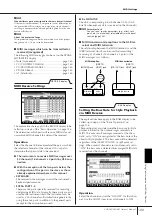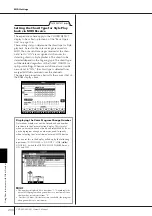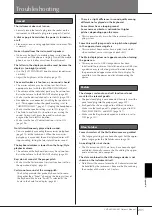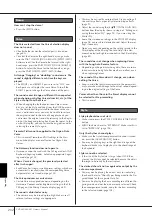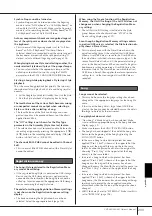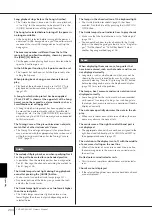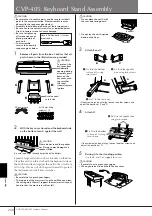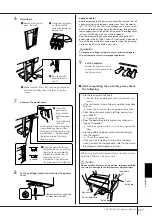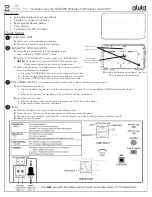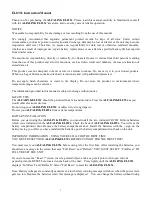
Using
Your Instrument with Other Devices
CVP-405/403/401 Owner’s Manual
192
Connect to the Internet (
)
[LAN] Port)
There are three ways to use the [LAN] port (located on
the bottom left of the instrument) to access special Inter-
net websites, and download song data, etc.
See page 172 for instructions on connecting.
What is MIDI?
Put simply, MIDI is a data transfer standard that allows
easy and comprehensive control among electronic/digi-
tal music instruments and other devices. To get a better
idea of what MIDI does, let’s first consider acoustic
instruments, such as a grand piano and a classical gui-
tar. With the piano, you strike a key, and a hammer
inside hits some strings and plays a note. With the gui-
tar, you directly pluck a string and the note sounds.
But how does a digital instrument go about playing a
note?
As shown in the illustration above, in an electronic
instrument the sampling note (previously recorded
note) stored in the tone generator section (electronic
circuit) is played based on information received from
the keyboard.
Now, let’s examine what happens when we playback a
recording. When you play back a music CD (for exam-
ple, a solo piano recording), you’re hearing the actual
sound (vibration in air) of the acoustic instrument. This
is called audio data, to distinguish it from MIDI data.
In the above example, the actual acoustic sounds of the
pianist’s performance are captured in the recording as
audio data, and this is recorded to CD. When you play
back that CD on your audio system, you can hear the
actual piano performance. The piano itself is not neces-
sary, since the recording contains the actual sounds of
the piano, and your speakers reproduce them.
Copying files from a computer hard disk to a
USB storage device
Files contained on the hard disk of a computer can be
transferred to the instrument by first copying them to the
storage media, then connecting/inserting the media to the
instrument.
Not only files created on the instrument itself but also
Standard MIDI files and Style File-formatted Style files cre-
ated on other devices can be copied to a USB storage
device from the hard disk of the computer. Once you’ve
copied the data, connect the device to the [USB TO
DEVICE] terminal of the instrument, and play back the
data on the instrument.
Copying the files of the hard disk of the computer to the USB
storage device
Computer
USB storage device
Instrument
Instrument
Computer
USB storage device
Reading files on the USB storage device from the instrument
[USB TO DEVICE] terminal
Disconnect the USB storage
device from the computer and
connect it to the instrument
R
L
Internal amp
Playing the key board
Internal amp
Tone generator
(Electric circuit)
Acoustic guitar note
production
Digital instrument note pro-
duction
Pluck a string and the
body resonates the
sound.
Based on playing information
from the keyboard, a sampling
note stored in the tone generator
is played through the speakers.
Recording
Playback
Recording and playing back the performance of an
acoustic instrument (audio data)
Connecting a Computer or USB Device





